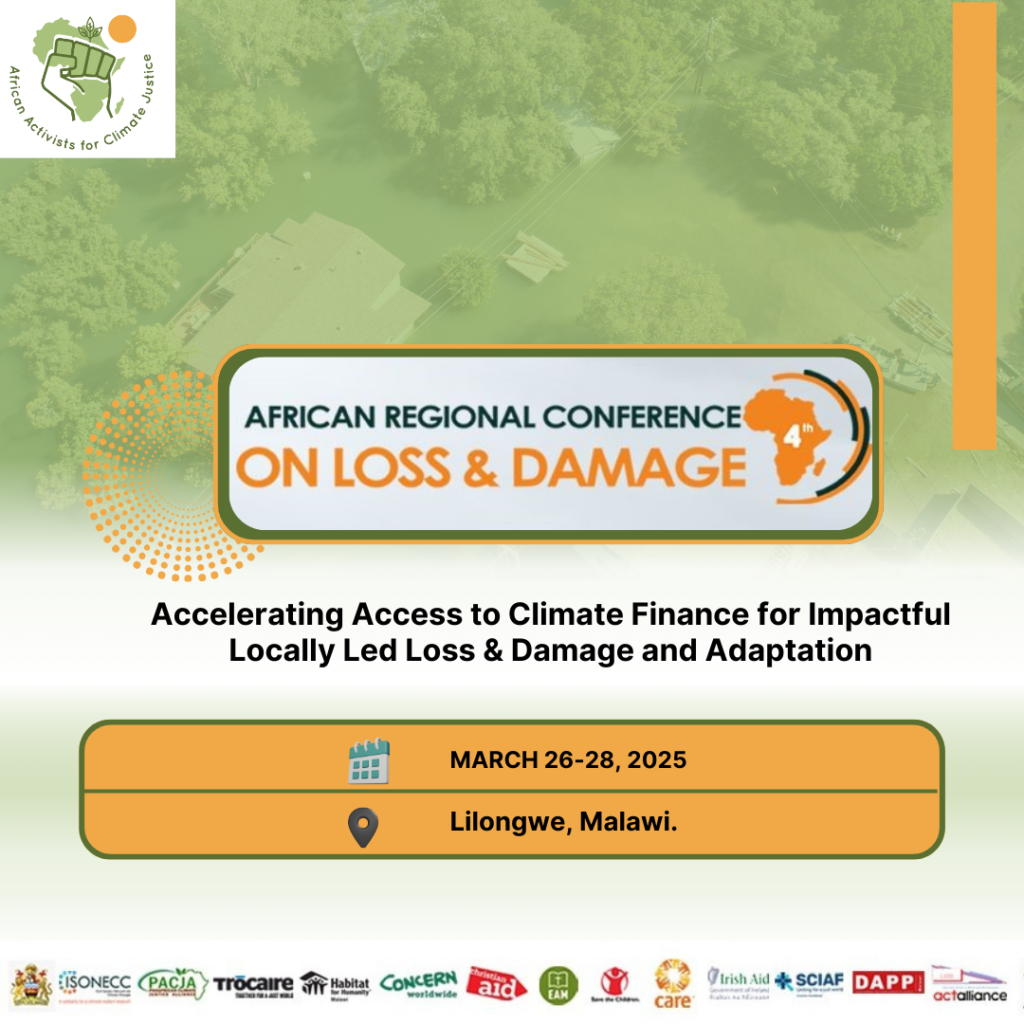
African Activist for Climate Justice (AACJ) is proud to participate in the 4th African Regional Conference on Loss and Damage, taking place from March 26-28, 2025, at Cross Roads Hotel in Lilongwe, Malawi. This crucial conference will bring together African governments, civil society organizations, development partners, and climate justice advocates to drive forward urgent discussions on financing for climate adaptation and loss and damage.
Represented by one of the project partners, the Pan African Climate Justice Alliance (PACJA) and a member of the Project Management Unit (PMU) our participation at this conference is critical as we advance our mission for climate justice, focusing on just and equitable loss and damage financing for Africa.
With climate change impacts intensifying across Africa, the conference aims to advance locally led solutions and mobilize much-needed resources to protect vulnerable communities.
Why This Conference Matters
Africa is on the frontlines of the climate crisis, experiencing increasing extreme weather events such as droughts, floods, and cyclones. Despite contributing the least to global emissions, African countries bear the heaviest burden of climate-induced loss and damage. The 4th African Regional Conference on Loss and Damage provides a critical platform to:
- Review the outcomes of COP29 and their implications for Africa’s role in global climate diplomacy.
- Advocate for fair and accessible climate finance that prioritizes the needs of vulnerable communities rather than burdening them with loans.
- Strengthen mechanisms for locally led climate action, ensuring that loss and damage responses are community-driven and context-specific.
- Push for accountability in climate finance, guaranteeing that funds reach those most affected by climate change.
Loss and damage refer to the negative impacts of climate change that cannot be avoided through mitigation or adaptation. These include economic losses, such as destruction of infrastructure and reduced agricultural yields, as well as non-economic losses, such as displacement, loss of cultural heritage, and ecosystem degradation. The concept acknowledges that some climate impacts go beyond what communities and ecosystems can adapt to, necessitating compensation and support mechanisms.
Adaptation, on the other hand, involves proactive and reactive measures that help communities adjust to the changing climate and minimize risks. This includes building resilient infrastructure, developing early warning systems, and promoting climate-smart agricultural practices. Strengthened adaptation efforts can reduce vulnerability and enhance the ability of communities to withstand climate shocks.
The focus on financing is critical because addressing loss and damage, as well as implementing adaptation measures, requires significant financial resources. However, current climate finance flows remain inadequate, and African nations struggle to access funds that should rightfully support their climate responses. Ensuring that financial commitments from developed nations are met and that funding mechanisms are equitable and transparent is essential for effective climate action on the continent.
AACJ’s Role at the Conference
Through our partners, the AACJ has been at the forefront of climate justice advocacy in Africa, tirelessly working to ensure that African voices influence global climate policies. At this conference, our partner, PACJA will:
- Advocate for increased and accessible funding for loss and damage in Africa.
- Call for reforms in global climate finance mechanisms to ensure equity and justice for developing nations.
- Engage policymakers and civil society in developing a roadmap for integrating loss and damage financing into Nationally Determined Contributions (NDCs) and National Adaptation Plans (NAPs).
- Highlight the urgent need for climate reparations from the Global North to the Global South.
Expected Outcomes
The conference is set to produce key outcomes, including:
- A communiqué outlining Africa’s demands for enhanced loss and damage finance.
- A roadmap for strengthening community-led climate resilience efforts.
- Policy recommendations to inform Africa’s position at COP30.
- A conference report and media outputs to amplify Africa’s climate justice agenda.
Join the Conversation
PACJA calls on all climate advocates, policymakers, and stakeholders to actively participate in this landmark event. Follow our updates, engage in discussions, and join us in demanding climate justice for Africa. For more information and real-time updates, follow PACJA and Civil Society Network on Climate Change (CISONECC)on our social media platforms
